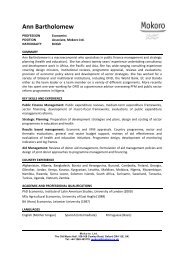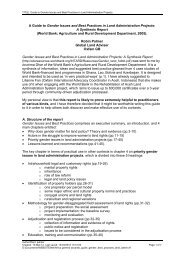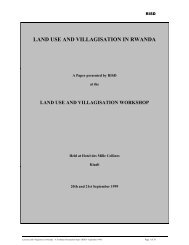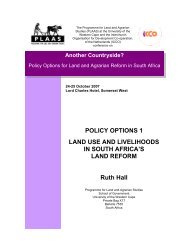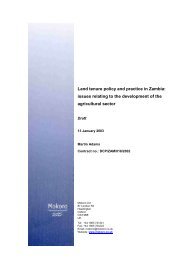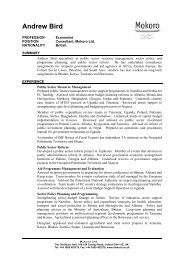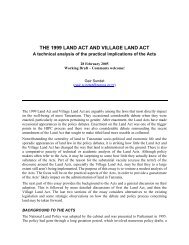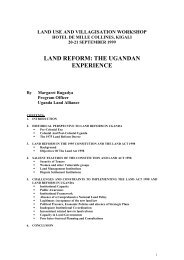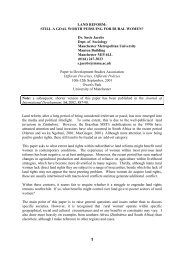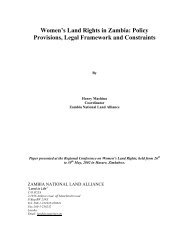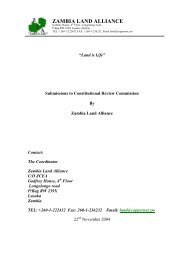Malawi National Land Policy - Mokoro
Malawi National Land Policy - Mokoro
Malawi National Land Policy - Mokoro
Create successful ePaper yourself
Turn your PDF publications into a flip-book with our unique Google optimized e-Paper software.
Ministry of <strong>Land</strong>s Page 40<br />
responsibilities of traditional leaders in land matters. This study that involved all major ethnic<br />
groups in the country concluded that, although the customary tenure system has changed<br />
fundamentally to emphasize individual family rights, the concept of community and the<br />
supervisory authority of traditional leaders remain strong.<br />
5.7.2 Normally, Family Heads and Clan leaders of long established families and/or clan<br />
landholders are entitled to make individual land allocations. Only when large, extensive and<br />
contiguous amounts of customary land are required would the allocation require the decision of<br />
a group of traditional leaders.<br />
Traditional Leaders, in the context of this <strong>Land</strong> <strong>Policy</strong>, refers to the entire<br />
hierarchy of administrators starting from the lowest unit for allocating<br />
land, the Family Head, and rising through to the Paramount Chief.<br />
(a) Village lands are administered in units represented by Family<br />
heads, Clan Leaders, Village Headpersons and Group Village<br />
Headpersons.<br />
(b) Traditional land administration involves parcels managed by<br />
the Chief of a Traditional <strong>Land</strong> Management Area.<br />
(c) The land allocating jurisdiction of the hierarchy of traditional<br />
leaders coincides with the politically recognized Traditional<br />
Authority system in <strong>Malawi</strong>.<br />
5.7.3 The traditional allocation system ensures that everyone has a piece of land. CLUS found<br />
that 90% of rural households own their land. Of those who have land, 80% inherited the land<br />
directly from their parents, 16% were allocated virgin land by the village Headperson and less<br />
than 1% purchased the land. Only 3% of rural households were found to be completely<br />
landless.<br />
5.7.4 There is no doubt therefore, that the customary allocation system is egalitarian in the<br />
sense of assuring direct grants of land to members. This egalitarianism only applies to ethnically<br />
related members of the community and others who have settled permanently in the community.<br />
The system seriously discriminates against outsiders and does not encourage internal migration<br />
to relieve land pressure. Non-members are only permitted to lease land under customary<br />
tenancy arrangements that clearly ensures the right of repossession or reversion to the<br />
landowners.<br />
5.7.5 Furthermore, the system of inheritance encourages the fragmentation of family holdings.<br />
A substantial number of people regularly resort to renting land for cultivation due to land<br />
shortages and in situations where fragmented holding have become too small to support viable<br />
agricultural enterprise.<br />
(a) The Government will preserve the land administration and policy<br />
monitoring responsibilities of traditional leaders and will encourage<br />
http://www.malawi.gov.mw/lands/landpol.htm 29/03/2005 15:23:13



